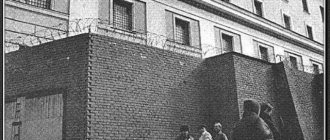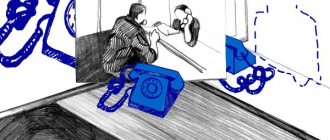Imprisonment is the most severe punishment provided for by the Criminal Code of the Russian Federation. The mere presence of a criminal record can significantly ruin a person’s life, because it is difficult for a convicted person to find a job and take a worthy place in society. If we talk about being in prison, then to an unprepared person this place may seem like a real hell. In addition to restrictions on freedom, there are other prohibitions imposed by the administration and the prisoners themselves. Once here, the prisoner will have to get used to life “by convention”, the lack of basic amenities, the eternal dampness, stuffiness and unpleasant smell.
It is not difficult to contract a serious illness in places of confinement, and many physically healthy people returned from prison sick and infirm. However, the most serious test is the psychological pressure that everyone who ends up in a colony or prison has to endure. Below we will talk about what people who have been behind bars rarely talk about.
Greeting upon entering the house
To understand how to enter a house, you need to remain calm and observe the norms of behavior when entering any house. The first thing you need to do is say hello, without starting long stories.
In most cases, no one is preparing to humiliate or mock the first move. It is only important to choose the right greeting option.
Correct greeting options
The simplest greeting option is “Hello.” There is no need to say “hello everyone”, “hello” and the like. Under no circumstances should you use the phrase “good afternoon or evening” as a greeting.
There are several other common greeting options:
- "Peace to your home." It is most often used by those who are not in prison for the first time, but a newcomer can also greet fellow inmates with this phrase.
- "Hello honest lads." The emphasis in the word “honest” is always on the last syllable.
- “Salaam is common to people.” This is also a fairly common greeting, which does not apply to prisoners belonging to the lower caste, since they are not considered “people” in prison.
- "Good health to the people." Another neutral and applicable greeting option.
It is best to try to find out, even before entering the cell, what greetings are accepted in this particular camp, and which ones should not be used under any circumstances. True, it is not always possible to obtain this information, especially for a person who finds himself in prison for the first time.
About medicine in prison
Many people who go to prison already have health problems. Often prisoners with tuberculosis, HIV and syphilis sit in the same cell. And naturally, no one is going to treat them. Moreover, prisoners with serious illnesses do not claim special treatment.
If a prisoner had a toothache, the most he could achieve was for a doctor to come. Next, the doctor could use dirty forceps to pull out a tooth right in the corridor, after which the prisoner would be thrown back into the cell.
Due to poor hygiene, the skin begins to itch over time. And if the prisoner scratches, the skin will quickly become covered with ulcers. In this case, the convicted person can count on treatment only if his relatives manage to reach an agreement with the doctor. Otherwise, any disease can be treated in prison with an activated carbon tablet.
How not to greet inmates
There are a lot of prohibitions in prison, especially regarding conversation. Therefore, you should refrain from greetings that will lead to additional questions or offend other prisoners.
These include:
- "Hello, bros." The gang in the zone is considered to be the thieves caste, and in the cell there may be representatives of different castes. By equalizing them all with this greeting, the newly arrived prisoner makes a grave mistake, for which he may be called to account.
- "Great, guys." The greeting itself is considered normal, but it is addressed only to the corresponding caste, which may not be liked by the same thieves who are not greeted in this case.
- "Good afternoon, people." The reaction to such a greeting upon entering a house depends on the mood of its inhabitants. A newcomer may be asked why he considers another day in captivity a good day. He doesn’t need unnecessary conversations of this kind, because in them, out of ignorance, you can always say something wrong.
Conditions of serving
The designation of the type of correctional institution is regulated by the provisions of Article 87 of the Penal Code of the Russian Federation.
Strict regime penal colonies are provided for a specific category of convicts, which, in accordance with the norms of paragraph 1, paragraphs. “c, d” of Article 87 of the Penal Code of the Russian Federation includes only men:
- repeat offenders of light and moderate crimes;
- those who have repeatedly committed serious crimes;
- who committed a particularly serious crime for the first time.
Prisoners serve long sentences here, or the remainder of their sentence after being transferred from a general regime colony for malicious violation of internal regulations. Sometimes especially dangerous criminals are transferred here to complete their sentence if their behavior in the special regime zone was exemplary.
All prisoners arrive at a secure institution on a general basis and are subject to normal conditions of stay. Subsequently, at the discretion of the colony administration, they can receive a differentiated regime: light or strict conditions .
| Conditions of detention | Regular | Lightweight | Strict |
| Legislation | Clause 1 of Article 123 of the Penal Code of the Russian Federation | Clause 1 of Article 123 of the Penal Code of the Russian Federation | Clause 1 of Article 123 of the Penal Code of the Russian Federation |
| Accommodations | dormitories | dormitories | Closed premises, time outside the cells is spent according to the regulations - one hour, by special order - up to three hours. |
| Additional spending of money | 7,800 rubles | 9 thousand rubles | 7,200 rubles |
| Number of dates per year | 3 short-term, 3 long-term | 4 short-term, 4 long-term | 2 short-term, 2 long-term |
| Number of transmissions per year | 4 parcels (deliveries), 4 parcels | 6 parcels (transfers), 6 parcels | 2 parcels (transfers), 2 parcels |
They can be transferred to light conditions in accordance with the norms of paragraph 2 of Article 122 of the Penal Code of the Russian Federation at the discretion of the administration 9 months after arrival in the colony for positive changes that have occurred in the personality of the convict, which are expressed in the following:
- conscientious work;
- maintaining discipline;
- absence of penalties and complaints;
- other achievements eligible for incentives.
Accordingly, to strict conditions in accordance with the norms of paragraphs. 3,4,5 of Article 122 of the Penal Code of the Russian Federation, the administration transfers those prisoners who deserve more severe conditions of detention, in particular:
- for regular violation of internal regulations;
- malicious violation of discipline;
- committing crimes during imprisonment;
- destruction of the moral microclimate in the surrounding society;
- undermining the authority of the administration of a security institution;
- other destructive forms of behavior that cause criticism.
If the assignment of a maximum security regime does not have the desired effect, the prisoner may be transferred to prison. When corrected, they are transferred to normal mode.
What is “Evening at the House”?
This expression is not exactly a greeting. It rather means an offer to have a good time from 20.00 until the morning.
At this time, the control of the guards is not so strict and the prisoners begin to mind their own affairs.
Most often this is:
- Gambling and other games.
- Conversations under chifir.
- Reading, drawing and other creative activities.
- Exchange information and products with other cameras.
- Resolving relationships and resolving issues that arise.
Replies to greetings are also regulated by prison traditions:
- In response to “evening in the hut” you should say “chifirok for sweetness”.
- “Mother good luck, one hundred aces in the deal” is a wish for those who are going to play cards.
- Among thieves there is a separate version of the greeting “AUE. Evening in the hut is life for thieves.” The abbreviation AUE means the prisoner's way of life is one and symbolizes the unity of thieves.
However, those entering the zone for the first time should not use such greetings. You need to be simpler and not show off.
Types of beholders
Behind the zone, the main watcher.
This is the most powerful, authoritative and persistent prisoner. General of the underworld. He has excellent relations with thieves in law, he is able to resolve the most difficult and complex conflicts.
Behind the unit.
This place is usually occupied by an experienced, over-aged convict, who has an impressive “track record” behind him. Such a person complies with all thieves' laws, he is always aware of how to properly behave as a link between prisoners and the administration.
For the common fund (he is also the faithful assistant of the “governor”).
He is responsible for providing food, tobacco and other key items, and also handles financial transactions.
Behind the "quarantine".
“Quarantine” is a special room where new convicts are temporarily kept. In “quarantine”, the future fate of the convict is determined - he receives membership in a certain suit, and the further quality of his life in prison depends on this. In addition, the beholder resolves everyday issues and resolves conflicts.
In the country.
This could be a criminal authority, for example, a thief in law or a “governor.” According to his “title,” he governs the city and is the commander of the districts in charge. He is responsible for resolving disputes and monitoring the filling of the common fund. Often carries out illegal activities, resorting to extortion and other criminal acts.
How to greet other prisoners?
When you enter a hut and say hello, you should not expect handshakes and shake hands yourself, even if there are people you know among the prisoners. This is due to the fact that:
- It is unknown what “caste” the prisoner belongs to. If he finds himself in the lower “caste” of the degraded, then shaking hands with him will transfer the newly arrived prisoner into this category.
- Likewise, men (the corresponding category of convicts) will not shake hands with a new arrival without finding out why he is imprisoned and how he lived in freedom.
- Thieves extremely rarely shake hands at all, taking into account the possible consequences and getting rid of the very habit that these consequences may entail.
You should always remember the general rules of greeting:
Have a question for a lawyer? Ask now, call and get a free consultation from leading lawyers in your city. We will answer your questions quickly and try to help with your specific case.
Telephone in Moscow and the Moscow region: +7
Phone in St. Petersburg and Leningrad region: +7
Free hotline throughout Russia: 8 (800) 301-39-20
- Greet strangers only verbally.
- It is better not to say hello to “goats” (suspected of snitching) at all, so that you yourself are not suspected of the same thing.
- Do not shake hands with your hands down.
- In your category, you can say hello in any way.
It is important to greet and communicate politely and kindly, but without excessive sweetness and servility.
First days
Any newcomer is a tasty prey for people who are already tired of a boring and stressful inner life.
Therefore, many will try to have fun at the expense of the newcomer, and at the same time find out how dangerous or beneficial he can be for the tester.
However, the “examiners” will not go beyond what is permitted, unless, of course, the newcomer provokes them with his behavior and statements.
How are newcomers welcomed?
By asking questions.
Based on the answers and behavior received, they will judge who the newcomer is and what place he should be given in the local hierarchy.
Be sure to ask:
- “Who is this and who is he in life.”
- “Why were you imprisoned and for how long?”
- “How I got my food in the wild.”
How to enter the house?
What is the correct way to enter a house in the zone on the first day?
- Calmly, politely, showing respect for those living in the cell, but without currying favor with anyone.
- Be sure to say hello and introduce yourself by name.
- Do not extend your hand, do not shake someone’s hand in return - not a single prisoner will do this from the heart, only with forgery.
Tell the cell leader under what article he was convicted. Do not agree to any games. Over time, you can figure out what's what and which of the entertainments you can really afford, and which will only bring trouble. If you are forced to play, be sure to first say in front of witnesses that you personally are “playing without interest.” This way, those forcing you to play will not have the opportunity to force you into some kind of debt.
Greetings
A simple “hello” is enough. The ban on handshakes has already been discussed above.
How should a first mover behave?
Not fawning over anyone, not trying to gain the favor of the authorities through snitching, not showing concern for the fate of others.
In prison it is vitally important to be calm, abiding by internal regulations, polite and indifferent to others. . How to survive?
How to survive?
How to survive in prison as a newbie?
- Respect internal laws, do not try to seem like an experienced lesson.
- Never take someone else's. Left unattended can be a bait for inflicting reprisals for violations of “concepts” or for the sake of entertainment. In addition, a nobody's item may belong to someone from a lower caste. And one touch will be enough to find yourself in it without the ability to correct the situation.
- Watch your appearance.
- Don’t talk too much about yourself, don’t ask strangers about their lives.
- Do not accuse anyone of anything without hard evidence. Unconfirmed information will cost those who spread it dearly.
What happens next
Much depends on which cell the newcomer is placed in. If this is a so-called “proper hut” in which men sit under the supervision of one of the thieves, then usually the first mover is not even given a “registration” and is not mocked at.
But there are cells of gopniks (“cattle”), in which making fun of a person is a favorite pastime. You need to be especially careful with such prisoners.
Specifically, after the greeting, no reaction may follow. In this case, you need to loudly name your article, its paragraph and the term of imprisonment. Usually the cell already knows about it, so an honest story in this case will show the newcomer from the best side.
Who might be watching
Mention of the first watchers can be found in prison chronicles back in the distant 30s of the last century during the Soviet system.
Judging by the name, the purpose of establishing such a “position” was to control the discipline and life activities of convicts.
Today, getting this “position” is very difficult. According to the canons of thieves, a candidate for the position of overseer must have a large number of “merits”, which, according to ordinary concepts, clearly do not seem like merits.
The observer should not have army experience behind him - such people are called “automatic mugs”; they cannot be authorities among the prisoners.
A prisoner who served in the Ministry of Internal Affairs, in the civil service, and was also a professional soldier will not become an observer.
The path to the beholders is closed to a murderer or rapist.
A prisoner who is an authority figure among those prisoners who will be under his command has a good chance of becoming an observer. The applicant must have a strong criminal record with a serious list of crimes committed and he must have experience of “serving time.”
In addition, his ability to make the right decisions and ability to build relationships with prison employees are also important.
What questions can be asked to the first mover in the house and how to answer them?
Knowing how to enter a house, you need to know how to correctly answer the most common questions. The main rule is to answer honestly, since in prison it will not be possible to hide the nuances of the case. And because of lies, additional problems may arise in the future.
Main questions:
- “What are you convicted of?” The answer should be an article of the Criminal Code.
- Question about the deadline. You also need to give an honest answer.
- "Who are you?". Based on the article and biography, you need to define yourself into one or another “caste”. If the article does not apply to those not respected in the zone (rape, child molestation, etc.), then you need to answer “man”. Thieves say “tramp”, and those who are despondent say “a despondent person”.
- “What was the driving force?” If you don’t have a nickname, it’s better to come up with one in advance. Otherwise, the prisoners will come up with it themselves, but it is not a fact that the prisoner will like it.
After such questions, the beholder will determine the bunk for the new arrival. Then he may be invited to drink tea, where during a conversation they will ask in more detail about life in freedom. The purpose of such conversations is to determine what kind of person is in the cell.
Pre-trial detention center - a prison for the unconvicted
The pre-trial detention center is a real prison. Everyone who has been here at least once knows about this. And the saddest thing is that pre-trial detention centers most often contain people against whom a conviction has not yet been made. That is, they are actually innocent, but still, they are in prison.
This conclusion can be made if we turn to the text of the presumption of innocence, enshrined in Article 14 of the Code of Criminal Procedure of the Russian Federation. It says that a person is presumed innocent until proven otherwise.
People suspected of committing a crime often end up in pre-trial detention. And while the investigation is underway, and officials are trying to prove the citizen’s involvement in criminal acts, he is behind bars. Moreover, he can sit in a pre-trial detention center not for a day or two, but for several months or even years.
When a person ends up in a pre-trial detention center, everyone forgets about the presumption of innocence. In fact, he is in prison until sentencing. Subsequently, if the person is convicted, the time he spent in the pre-trial detention center will be included in the total term of imprisonment.
To improve their situation, suspects hire lawyers. Defense attorneys are expensive, and some people have to sell their apartments to cover legal battles. A public defender may also be assigned to the person. However, he is unlikely to actively defend his client’s position. Often such lawyers are a cross between an investigator and a prosecutor. Their goal is to convince a person to admit guilt in exchange for a reduced sentence.
Once in prison, a person feels lonely. Many prisoners are turned away by their wives and husbands, and only close relatives continue to pass on programs after several years of imprisonment.
Is there a custom of registration now?
Another old custom that remains only in minors and in general regime areas.
Its essence is to test the intelligence of a beginner. He is asked tricky questions that are important to answer correctly. In this case, you usually cannot choose from the proposed answer options (contained in the question itself), because they are all losing.
When choosing a domino tile “five-six” you need to say “a line between them”, because the five is the symbol of the omitted one, and the six is the symbol of the snitch.
If the new arrival fails to register, he will be given a second try. But if in this case he fails, he will fall into disqualification or will have to pay his way out of it.
Every morning at six in the morning they played the anthem, then Vysotsky’s song about exercise. Nobody woke up from this because we had a black zone. They also didn’t force me to do something as crazy as exercise, but I ran around the local area, and some people lifted weights with dumbbells. They were made by themselves from a piece of iron, which was welded to the handle. Usually the administration turned a blind eye to this. I trained as a seamstress and a turner at a vocational school. Turning didn’t work out for me, I never even stood at a machine, I went to lectures and hung out. Worked in a sewing factory. The industrial area looks like an old Soviet factory; there is almost no waste there. The masters come from the outside, they are not employees of the Federal Penitentiary Service. I had a good teacher, a seamstress. She was so responsive and pleasant, she fed us cookies all the time. She treated us like schoolchildren. When I was working the second shift at the industrial plant, they opened their own canteen. And not a thousand people have to eat there, but 150. Accordingly, it’s much faster, and if you’re the last one to eat, then there’s a lot of bread left there, and you can take extra porridge. You come to the dining room, they give you food already on a plate, and you have your own spoon in a case. Magi crushed cubes into everything: into porridge, into barley, into rice, into soup. Someone soaked the bread, crushed a magi cube on top and ate it, the result was bread with the taste of seasoning. This is certainly not Shalamov; people there did not starve. We were always given subscriptions to newspapers from outside. It’s been like this since pre-trial detention. In the zone I had “Novaya Gazeta”. Andrey Barabanov, my accomplice, who was sitting with me, was also subscribed to Vedomosti and Afisha. Then we signed up for “Gaming Mania”. It turned out that this was much needed reading in the colony. Because the zone is black or gray in color, but in “Gaming Addiction” the screenshots from the games are so colorful. There were hiding places - this is a sacred thing, it’s called a trigger. They hid phones, players, chargers, SIM cards, and flash drives. The knife cannot be stored either. According to the PVR, he is lying in the kitchen. You must borrow it from the caretaker for a limited amount of time. But this is inconvenient, because there are 200 people in the building, everyone is cooking something. Knives were made en masse at the industrial site, simply from pieces of reinforcement and iron. The same turners made them for cigarettes, or if you have a good relationship with them, then for free. They usually hid the knife in the bedpost: they stuck it in and attached a magnet so that the knife would not fall down. They hid phones in whatever way they wanted: in floors, in walls, in shelves, in teapots, in baseboards. One time it happened that I put my phone and charger in my underpants and pretended to be asleep. The garbage came into our passageway, apparently he knew that we had a phone, and let’s move around the floor, he tried to open everything. I pretended to be asleep, lay there and snored. When the cop started waking me up, he pretended that he had just woken up and even grumbled at Vasilich (he calls Garbage by his patronymic). He “patted” my pocket on my right thigh, then my left one, and then he left. And my phone and charger were in the middle (laughs). They also make emergency triggers - the space under the board in the floor. When garbage comes in, the phone is simply thrown into this tunnel, then it is difficult to get it out, but the garbage most likely will not open the floor. You will save your phone, although you will have difficulty getting it out later. If, after all, the cache was found, then it was possible to negotiate with the garbage and give him money.
A little about everyday life
In prison life there are a number of strict taboos, violating which a new prisoner will “end up” with the lower caste and end up in it himself.
It is forbidden:
- Picking up other people's things from the floor.
- Taking other people's things or finishing smoking cigarettes.
- Don't say too much.
- Don't be pretentious and don't show too much intelligence.
- Do not touch other people's things without permission.
- Don't go to the toilet when someone is eating.
- Do not spit or spoil the air in the chamber.
These are strict prohibitions that must not be violated under any circumstances, as you may end up in the lowest category of prisoners.
About cells in prisons
The cell is a small (area 15-20 m2) stuffy room, in which 15-20 people are located at the same time. There may be two or three-tier bunks, a table and a toilet with a small sink. There is a small barred window in the wall.
You can forget about fresh air - it’s very stuffy in a room with so many people. The air duct does not cope with its task, since it is infested with rats, which can fall on the prisoner’s head at any moment.
There can be no talk of any kind of laundry - things are washed directly in the sink and hung between the bunks. Sometimes, due to overcrowding, there are simply not enough beds for all the prisoners. In this case, the prisoners sleep in turns.
Tips on what not to do
There are a number of general rules of decency that should also not be violated:
- Do not pry into the souls of other convicts, do not ask them about their life outside and the charges for which they are imprisoned.
- Don't gamble "just for fun." Otherwise, you can lose yourself.
- Do not address other prisoners with “Can I ask?” Instead they say “may I ask?” The first option is associated with the demand for some mistakes a person made in observing prison etiquette.
- Do not use obscene words. In some cases, this can lead to serious consequences.
- Don't brush your teeth while someone else is in the toilet.
- Do not contact the administration unless absolutely necessary.
- Do not talk about prosperity in freedom.
- Don't talk about his popularity among women in the wild.
All this can be generally described by the rule of speaking as little as possible when not asked and not insulting other people.
Main functions
The responsibilities that the beholder has make it possible to better understand the “inner kitchen” of the suit.
Its functions include checking newly arrived prisoners and strictly monitoring the performance of duties by prisoners in the colony.
The overseer is responsible for assigning a particular suit to the convict, for resolving quarrels and conflicts and solving everyday problems. He is in charge of the common fund.
He also negotiates with the administration of the institution, has influence on everything that happens on his territory and strictly follows the rules of “life according to concepts.” The functions of such a “position” are directly dependent on the position he occupies in the local hierarchy.










